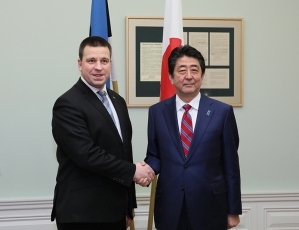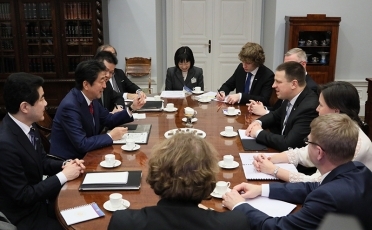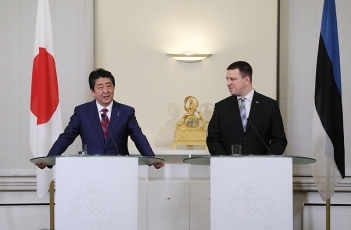Japan-Estonia Relations
Japan-Estonia Summit Meeting
January 12, 2018
 Photograph of the leaders shaking hands
(Photo: Cabinet Public Relations Office)
Photograph of the leaders shaking hands
(Photo: Cabinet Public Relations Office)
 Photograph of the Japan-Estonia Summit Meeting
(Photo: Cabinet Public Relations Office)
Photograph of the Japan-Estonia Summit Meeting
(Photo: Cabinet Public Relations Office)
 Photograph of the joint press announcement
(Photo: Cabinet Public Relations Office)
Photograph of the joint press announcement
(Photo: Cabinet Public Relations Office)
On January 12, commencing at 4:50 p.m. (local time) for approximately 50 minutes, Mr. Shinzo Abe, Prime Minister of Japan, who was visiting Estonia, held a summit meeting with H.E. Mr. Jüri Ratas, Prime Minister of the Republic of Estonia. The overview is as follows.
1. Opening remarks
Prime Minister Ratas welcomed Prime Minister Abe’s first visit to Estonia. Prime Minister Abe offered his congratulations on the 100th anniversary of the declaration of independence of Estonia and stated that Japan would like to cooperate closely with Estonia in addressing international challenges including the North Korea issues.
2. Bilateral relations
- (1) Prime Minister Abe stated that following the signing of the Tax Convention between Japan and Estonia in August 2017, Japan would work to advance the procedures towards its early entry into force. He also noted that Japan would like to promote bilateral investment and economic relations by dispatching a Japan External Trade Organization (JETRO) business mission and by retaining a correspondent as a contact point of JETRO in Baltic countries.
- (2) The two leaders welcomed the signing of the Tax Convention, the promotion of people-to-people exchanges, including the beginning of consultations towards introducing a working holiday program, and progress in economic relations by the business mission accompanying Prime Minister Abe on his visit.
- (3) As Prime Minister Abe stated in the joint press conference, Estonia is a leader in initiatives in the cyber area. Therefore, the two leaders confirmed that the two countries would continue to advance cooperation in this area, utilizing opportunities such as the Japan-Estonia Cyber Dialogue. From this perspective, the two leaders welcomed approval of Japan’s participation in the NATO Cooperative Cyber Defence Centre of Excellence located in Estonia. Furthermore, Prime Minister Ratas explained the importance of cyber and IT to Estonian society and the two leaders exchanged opinions about the importance.
- (4) The two leaders shared the view that they would establish the Japan-Baltic Cooperation Dialogue (note) in order to further promote cooperation between Japan and the Baltic States.
3. Japan-EU relations
- (1) The two leaders confirmed that the maintenance and strengthening of the international order based on the rule of law is a diplomatic and security challenge of the utmost importance that Japan and Europe, who share fundamental values, need to address in cooperation in the face of various challenges.
- (2) Prime Minister Abe expressed his appreciation for the cooperation of Estonia holding the presidency of the EU at the time of the conclusion of negotiations on the Japan-EU Economic Partnership Agreement (EPA). The two leaders also confirmed that they would continue to work together to realize the early entry into force of the EPA so as to strengthen bilateral trade and investment relations.
4. Other issues
- (1) With regard to North Korea issues, both leaders confirmed that they would never accept a nuclear-armed North Korea and that it was necessary to maximize pressure on North Korea by all means available so as to urge it to change its policy. Prime Minister Abe also requested Estonia’s understanding and cooperation for promptly resolving the abductions issue and received the support of Prime Minister Ratas.
- (2) Prime Minister Abe explained recent developments in Japan-Russia relations. The two leaders confirmed that Japan and Estonia would cooperate closely on the relations with Russia, while maintaining solidarity with like-minded countries, including G7.
- (3) The two leaders also confirmed the importance of a free and open maritime order based on the rule of law and shared the view that they oppose any unilateral actions or attempts to change the status quo that raise tensions.
- (Note) The “Japan-Baltic Cooperation Dialogue”
- A dialogue framework for promoting cooperation between Japan and the Baltic countries in a variety of fields in the future that Prime Minister Abe agreed to establish with the leaders of the three Baltic States when he visited them in January this year for the first time as Prime Minister of Japan. (Participation from the public and private sectors is envisaged).

